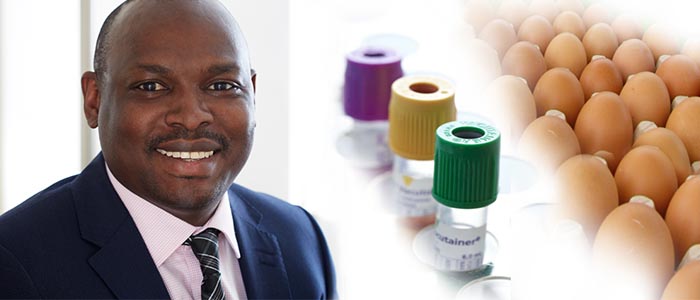20th February 2018
Anti Mullerian Hormone (AMH) Test Demystified
David Ogutu MRCOG
Medical Director and Consultant Gynaecologist
Follow the latest news and developments in the world of fertility.
< View all our fertility news and posts


20th February 2018
David Ogutu MRCOG
Medical Director and Consultant Gynaecologist
Infertility is defined as the inability for a couple to conceive despite regular unprotected sexual intercourse. Around 1 in 7 couples may have difficulty conceiving, which is approximately around 3.5 million people in the UK. Almost 84% of couples that have regular unprotected sex (every 2 or 3 days) will be able to conceive naturally within a year and 92% of couples will conceive naturally within 2 years of regular unprotected sex.
The couples who have been trying to conceive for more than 3 years unsuccessfully have 25% or less chance of falling pregnant naturally within the next year.
It is therefore advisable to seek medical advice if you cannot get pregnant after a year of trying. Your doctor will get a detailed medical history from you and run investigations to try and identify the cause of your fertility problem before suggesting treatments that could help.
Women are born with their lifetime supply of eggs, and these gradually decrease in both quality and quantity over the years. One of the tests performed in specialist fertility centres during investigations for infertility is Anti Mullerian Hormone (AMH). The AMH is a hormone produced by the developing eggs (antral follicles). The higher the overall egg reserve, the higher the number of antral follicles.
The test determines the eggs quantity, but not necessarily their quality.
A recent study investigated 750 women in North Carolina, in the USA who were trying to conceive for up to three months between April 2008 and March 2016. They were 30 to 44 years of age and did not have a history of infertility. The researchers found that, among the women, the probability of conceiving was not any lower for those with low AMH levels. This shows that among those with no fertility problems, ovarian reserve on its own does not predict the chance of a pregnancy.
For those with difficulties getting pregnant and requiring IVF treatment, studies show, that women with a high egg reserve have lower cycle cancellation rates, more eggs retrieved, a higher probability of better quality embryos transferred at blastocyst stage (day 5 of embryo development), and a higher chance of having spare good quality embryos available to freeze, compared to those with a low egg reserve. The risk of ovarian hyperstimulation syndrome (OHSS) is unfortunately also higher with high ovarian reserve.
As a woman gets older, her egg quality declines as well. When fertilised, the older eggs are more likely to be chromosomally abnormal, thus the rates of infertility and miscarriage are higher in older women.
Age, as opposed to ovarian reserve, is, therefore, the best predictor of a chance of a pregnancy.
AMH is the most reliable method of testing egg reserve. It is a simple blood test that can be done at any time of the menstrual cycle and the results are available within 2-5 days.
The AMH can be measured on any day of the cycle and does not change from cycle to cycle. Most fertility experts nowadays prefer AMH to check ovarian reserve, rather than the Follicle-stimulating hormone (FSH) level.
It is useful for young women who want to postpone motherhood and want to check their fertility potential. Some women might assume that their fertility is fine as long as they are having regular periods; however, this is not always the case. If you have a low AHM, you may have to re-think your priorities.
For older women, those with irregular periods or symptoms of impending menopause, the test may help with decisions such as exploring alternative options e.g. egg donation or adoption.
AMH test is also invaluable for single women considering social egg freezing.
If you would like more information about AMH or would like to book an appointment for AMH testing please call us on 01992 78 50 60.